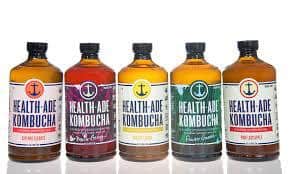A brief History and Future of Kombucha
What is Kombucha?
 Kombucha is a variety of fermented, lightly effervescent sweetened tea drink. It is made by fermenting tea and sugar with a microbial culture including yeast, bacteria and mould, and a variety of flavours and essences are added to give different tastes to the drink. Popular flavours now include those with mango, coconut, apple, berries, and a variety of herbs and spices and flavoured extracts such as vanilla.
Kombucha is a variety of fermented, lightly effervescent sweetened tea drink. It is made by fermenting tea and sugar with a microbial culture including yeast, bacteria and mould, and a variety of flavours and essences are added to give different tastes to the drink. Popular flavours now include those with mango, coconut, apple, berries, and a variety of herbs and spices and flavoured extracts such as vanilla.
The type of tea used to create Kombucha obviously influences the taste, even before flavourings are added. Black, white or green tea can all be used. The length of time used to ferment the product also affects the taste and alcoholic strength. A second in-bottle fermentation process is sometimes used to achieve a more complex flavour profile.
Where does Kombucha originate?
Tea, according to legend, was first invented by Emperor Shen Nong in 2737 BC. While boiling water, a leaf from a wild tree drifted into his pot creating the first tea. Intrigued by the refreshing taste, he continued to produce the beverage, and introduced it to his people.
Around 221 BC, the first known kombucha was invented by the Qin Dynasty for the Emperor Qin Shi Huangdi. It was known as “The Tea of Immortality”, thought to keep the emperor young and healthy.
The name Kombucha originated when the beverage was imported from Manchuria into Japan, and is said to have been imported around 415 AD by the physician Kombu and served to the Emperor Inyoko. The word is a combination of Kombu’s name and the Japanese word for tea, “cha”.
The medicinal benefits of the drink were highlighted when in 1913, a medical epidemic broke out in Germany. German researches looking for a cure came across a village on Russian peasants who were not affected by the epidemic. The factor they had in common was that the villagers all drank a homemade remedy, Kombucha, which had long been used in Russia as a health drink. A variation known as “Tea Kvass” has been made for hundreds of years in Russia.
Growth in consumption of Kombucha
With consumers taking a more organic and holistic approach to what they buy and drink, it is no surprise that the fermented probiotic drink is the fastest growing functional beverage in the beverage industry, according to Beverage Daily in 2016. Sales are anticipated to grow by at least 25% annually up to 2020.
Although most carbonated teas like Kombucha contain sugar or another sweetener, they are still perceived as healthier products because tea contains antioxidants. There are often probiotic cultures used in producing Kombucha, which can aid in detoxifying, and aiding the digestive and immune systems, and typically have a lower sugar and calorie content compared to traditional sodas.
A growing number of IC Filling Systems customers have invested in equipment for bottling Kombucha, including Bio Brasseurs in Strasbourg.
Semi Automatic Bottling Kombucha at Bio Brasseurs in Strasbourg
